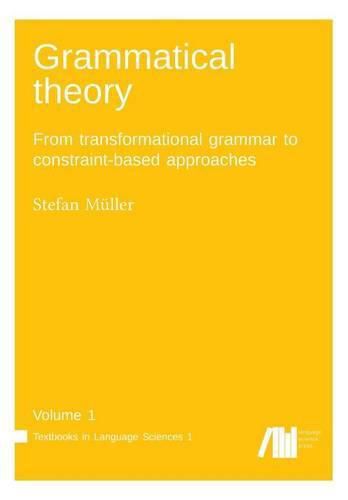Readings Newsletter
Become a Readings Member to make your shopping experience even easier.
Sign in or sign up for free!
You’re not far away from qualifying for FREE standard shipping within Australia
You’ve qualified for FREE standard shipping within Australia
The cart is loading…






This book introduces formal grammar theories that play a role in current linguistic theorizing (Phrase Structure Grammar, Transformational Grammar/Government & Binding, Generalized Phrase Structure Grammar, Lexical Functional Grammar, Categorial Grammar, Head-Driven Phrase Structure Grammar, Construction Grammar, Tree AdjoiningGrammar). The key assumptions are explained and it is shown how the respective theory treats arguments and adjuncts, the active/passive alternation, local reorderings, verbplacement, and fronting of constituents over long distances. The analyses are explainedwith German as the object language.The second part of the book (sold separately) compares these approaches with respect to their predictionsregarding language acquisition and psycholinguistic plausibility. The nativism hypothesis, which assumes that humans posses genetically determined innate language-specificknowledge, is critically examined and alternative models of language acquisition are discussed. The second part then addresses controversial issues of current theory buildingsuch as the question of flat or binary branching structures being more appropriate, thequestion whether constructions should be treated on the phrasal or the lexical level, andthe question whether abstract, non-visible entities should play a role in syntactic analyses.It is shown that the analyses suggested in the respective frameworks are often translatableinto each other. The book closes with a chapter showing how properties common to alllanguages or to certain classes of languages can be captured. With this critical yet fair reflection on various grammatical theories, Muller fills whathas been a major gap in the literature. Karen Lehmann, Zeitschrift fur Rezensionen zurgermanistischen Sprachwissenschaft, 2012 Stefan Muller’ s recent introductory textbook, Grammatiktheorie , is an astonishinglycomprehensive and insightful survey of the present state of syntactic theory for beginningstudents. Wolfgang Sternefeld und Frank Richter, Zeitschrift fur Sprachwissenschaft, 2012 This is the kind of work that has been sought after for a while. […] The impartial andobjective discussion offered by the author is particularly refreshing. Werner Abraham, Germanistik, 2012
$9.00 standard shipping within Australia
FREE standard shipping within Australia for orders over $100.00
Express & International shipping calculated at checkout
This book introduces formal grammar theories that play a role in current linguistic theorizing (Phrase Structure Grammar, Transformational Grammar/Government & Binding, Generalized Phrase Structure Grammar, Lexical Functional Grammar, Categorial Grammar, Head-Driven Phrase Structure Grammar, Construction Grammar, Tree AdjoiningGrammar). The key assumptions are explained and it is shown how the respective theory treats arguments and adjuncts, the active/passive alternation, local reorderings, verbplacement, and fronting of constituents over long distances. The analyses are explainedwith German as the object language.The second part of the book (sold separately) compares these approaches with respect to their predictionsregarding language acquisition and psycholinguistic plausibility. The nativism hypothesis, which assumes that humans posses genetically determined innate language-specificknowledge, is critically examined and alternative models of language acquisition are discussed. The second part then addresses controversial issues of current theory buildingsuch as the question of flat or binary branching structures being more appropriate, thequestion whether constructions should be treated on the phrasal or the lexical level, andthe question whether abstract, non-visible entities should play a role in syntactic analyses.It is shown that the analyses suggested in the respective frameworks are often translatableinto each other. The book closes with a chapter showing how properties common to alllanguages or to certain classes of languages can be captured. With this critical yet fair reflection on various grammatical theories, Muller fills whathas been a major gap in the literature. Karen Lehmann, Zeitschrift fur Rezensionen zurgermanistischen Sprachwissenschaft, 2012 Stefan Muller’ s recent introductory textbook, Grammatiktheorie , is an astonishinglycomprehensive and insightful survey of the present state of syntactic theory for beginningstudents. Wolfgang Sternefeld und Frank Richter, Zeitschrift fur Sprachwissenschaft, 2012 This is the kind of work that has been sought after for a while. […] The impartial andobjective discussion offered by the author is particularly refreshing. Werner Abraham, Germanistik, 2012